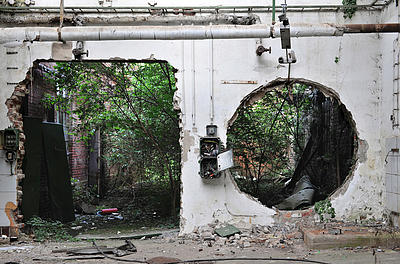Forst
Forst

“Ein Wald von Schornsteinen mit langen Rauchfahnen bildet die charakteristische Silhouette dieser Stadt. Fabrik reiht sich an Fabrik, ganze Viertel bedeckend in allen Stadtteilen. Lokomotiven durchfahren die Straßen und schleppen Waggon um Waggon, auf Rollböcke gesetzt, in die zahllosen Fabrikhöfe.”
Erwin Stein
“My formula for greatness…is amor fati: that one wants nothing to be different, not forward, not backward, not in all eternity. Not merely bear what is necessary, still less conceal it—all idealism is mendaciousness in the face of what is necessary—but love it.”
Ecce Homo
According to the pioneering conceptual artist Seth Siegelaub, only textiles go further than art in holding and revealing the meaning of the human condition and civilization. Certainly textiles and weaving have been a literal and metaphorical catalyst in architecture. Entire cities have developed around the textiles and entire building types have been invented for the weaving and trading fabrics. Indeed the origin of the flexible open plan framed office building is in the flax mill of the eighteenth century industrial revolution. The influence of textiles on architecture just as profound in the evolution of the decorative arts from clothes to Semper. We shall be looking at Forst, a city built on weaving but today threadbare and empty. It was once one of the biggest centers of world textile production but now lies ‘forgotten’ and half abandoned on the German-Polish border. The city and the surrounding landscape is the site of many interwoven histories. Half the city has disappeared, its materials and people living elsewhere, but Forst is still there, neither waiting nor acting, seemingly its only option to remain in a state between Amor Fati and Zweckoptimismus.
We will explore the potential of its empty industrial infrastructure. Working with the cunning of the bricoleur we shall look for small adjustments. Architectural strategies which accept absence and emptiness as a critical alternative to regeneration through fullness.
There will be a short site visit from Friday 7th to Monday 10th of October (240CHF - 450CHF).
We will start the semester by building a structure for performance next to Escher-Wyss-Platz, Zürich. We will collaborate with ZHDK and VBZ to develop a series of events which our structure supports.